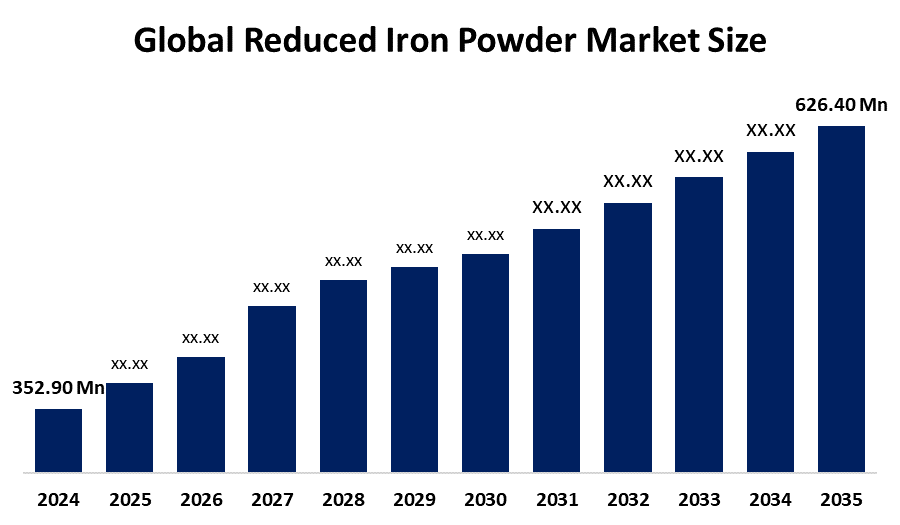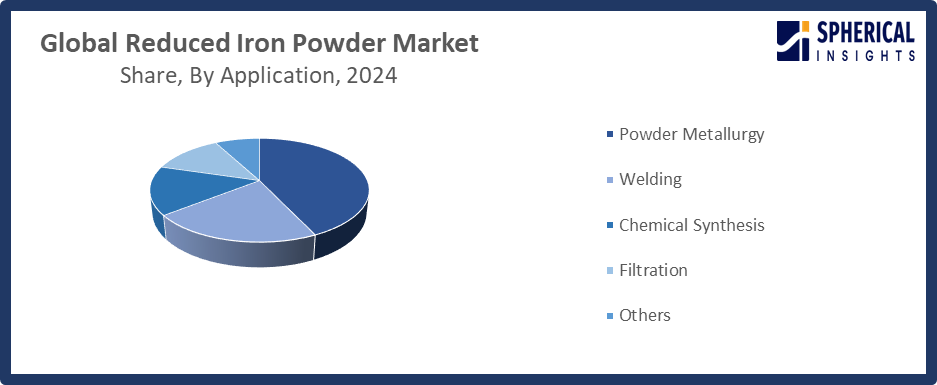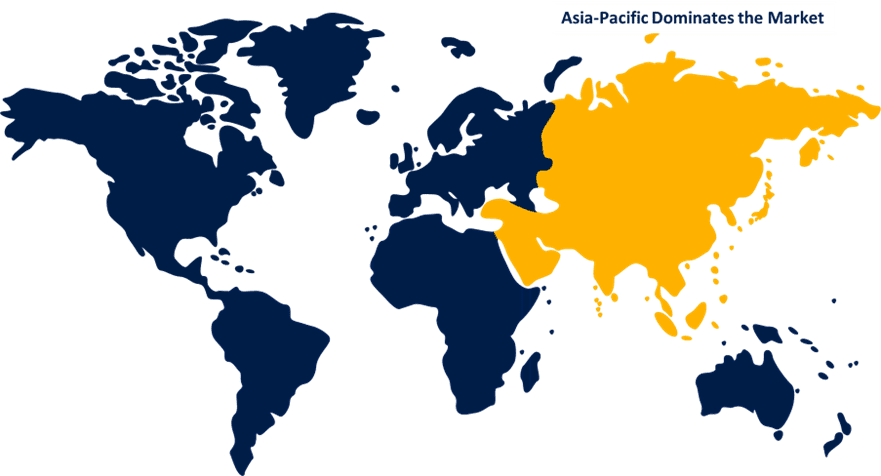Global Reduced Iron Powder Market Size, Share, and COVID-19 Impact Analysis, By Product Type (Atomized Reduced Iron Powder, Electrolytic Reduced Iron Powder, and Others), By Application (Powder Metallurgy, Welding, Chemical Synthesis, Filtration, and Others), and By Region (North America, Europe, Asia-Pacific, Latin America, Middle East, and Africa), Analysis and Forecast 2025 - 2035
Industry: Chemicals & MaterialsGlobal Reduced Iron Powder Market Size Insights Forecasts to 2035
- The Global Reduced Iron Powder Market Size Was Estimated at USD 352.90 Million in 2024
- The Market Size is Expected to Grow at a CAGR of around 5.35% from 2025 to 2035
- The Worldwide Reduced Iron Powder Market Size is Expected to Reach USD 626.40 Million by 2035
- North America is expected to grow the fastest during the forecast period.

Get more details on this report -
According to a Research Report Published by Spherical Insights and Consulting, The Global Reduced Iron Powder Market Size was worth around USD 352.90 Million in 2024 and is predicted to Grow to around USD 626.40 Million by 2035 with a compound annual growth rate (CAGR) of 5.35 % from 2025 to 2035. Growing applications in additive manufacturing and industrial processes, improvements in powder metallurgy technologies, and rising demand in the automotive, metallurgy, and electronics sectors all present opportunities for growth for the reduced iron powder market.
Global Reduced Iron Powder Market Forecast and Revenue Outlook
- 2024 Market Size: USD 352.90 Million
- 2035 Projected Market Size: USD 626.40 Million
- CAGR (2025-2035): 5.35%
- Asia Pacific: Largest market in 2024
- North America: Fastest growing market
Market Overview
The global production, distribution, and use of high-purity iron particles produced by direct reduction of iron ore using reducing agents like carbon monoxide or hydrogen, which results in a porous, sponge-like structure with superior metallurgical properties, are all included in the reduced iron powder (RIP) Market. The reduced iron powder market is gaining momentum as governments launch green initiatives. India’s 2024 National Green Hydrogen Mission launched hydrogen-based DRI projects, while the U.S. launched 2025 programs with tax credits to boost low-carbon iron powder technologies. In the industry, reduced iron powder is used on sintered products, which are used by the machinery and automotive sectors and contribute to the expansion of the market. The need for lower iron powder in industry, food, and pharmaceuticals is one of the biggest factors driving the reduced iron powder market. The industry is also being driven by rising demand for nutritional supplements, of which reduced iron powder is one of the most potent elements.
Key Market Insights
- Asia Pacific is expected to account for the largest share in the reduced iron powder market during the forecast period.
- In terms of product type, the atomized reduced iron powder segment is projected to lead the Reduced Iron Powder market throughout the forecast period
- In terms of application, the powder metallurgy segment captured the largest portion of the market
Reduced Iron Powder Market Trends
- Growing Adoption in Additive Manufacturing: Precision components made with metal injection molding and 3D printing are increasingly using reduced iron powder.
- Demand for lightweight, highly durable parts produced using powder metallurgy is driving growth in the automotive and aerospace industries.
- Production-related technological advancements include enhanced reduction methods for increased purity and better particle control.
- Rapid infrastructure development and industrialization are fueling market expansion in the Asia-Pacific region.
- Government initiatives that support low-carbon iron technology include the introduction of clean energy missions and tax breaks.
Report Coverage
This research report categorizes the reduced iron powder market based on various segments and regions, forecasts revenue growth, and analyzes trends in each submarket. The report analyzes the key growth drivers, opportunities, and challenges influencing the reduced iron powder market. Recent market developments and competitive strategies, such as expansion, Product Type launch, development, partnership, merger, and acquisition, have been included to draw the competitive landscape in the market. The report strategically identifies and profiles the key market players and analyzes their core competencies in each sub-segment of the reduced iron powder market.
Global Reduced Iron Powder Market Report Coverage
| Report Coverage | Details |
|---|---|
| Base Year: | 2024 |
| Market Size in 2024: | USD 352.90 Million |
| Forecast Period: | 2025-2035 |
| Forecast Period CAGR 2025-2035 : | 5.35% |
| 2035 Value Projection: | USD 626.40 Million |
| Historical Data for: | 2020-2023 |
| No. of Pages: | 188 |
| Tables, Charts & Figures: | 100 |
| Segments covered: | By Product Type, By Application and COVID-19 Impact Analysis |
| Companies covered:: | BASF, Ashland, Nutrien, DowDuPont, AkzoNobel, Yuean Metal, Belmont Metals, Salvi Chemical, Cathay Industries, Compass Minerals, Yara International, Spectrum Chemical, American Elements, Rio Tinto Metal Powders, and Others |
| Pitfalls & Challenges: | COVID-19 Impact, Challenges, Future, Growth, & Analysis |
Get more details on this report -
Driving factors
The demand for iron-fortified foods is being emphasized by governments and health organizations, which is propelling the market's expansion. Industry adoption of cleaner and more advanced technologies in industrial processes is being driven by the growing demand for sustainability and iron availability. The widespread application of reduced iron powder in the metallurgy industry is one of the main drivers of reduced iron powder market expansion. The production of lightweight, high-strength components in powder metallurgy depends heavily on reduced iron powder. The need for reduced iron powder has been greatly increased by the expanding automotive sector, which requires high-performance materials for the production of vehicles.
Restraining Factor
The market for reduced iron powder is restricted by several factors, including high production costs, a shortage of high-quality raw materials, energy-intensive manufacturing procedures, and strict environmental regulations. These factors work together to prevent widespread adoption and market growth in a variety of industrial sectors.
Market Segmentation
The global reduced iron powder market is divided into product type and application.
Global Reduced Iron Powder Market, By Product Type:
- The atomized reduced iron powder segment dominated the market in 2024 and is projected to grow at a substantial CAGR during the forecast period.
Based on product type, the global reduced iron powder market is segmented into atomized reduced iron powder, electrolytic reduced iron powder, and others. Among these, the atomized reduced iron powder segment dominated the market in 2024 and is projected to grow at a substantial CAGR during the forecast period. Melting and atomizing molten iron yields extremely pure and homogenous particles known as atomized reduced iron powder. This type's strong physical qualities, namely its high density and great compressibility, make it popular in the automotive and aerospace industries. The growing requirement for high-performance materials in these industries is predicted to fuel a large increase in the demand for atomized reduced iron powder.
The electrolytic reduced iron powder segment in the reduced iron powder market is expected to grow at the fastest CAGR over the forecast period. The electrolytic reduced iron powder is made via an electrolytic deposition method that guarantees fine particle size and great purity. Because of its reactivity and biocompatibility, this kind is especially prized in the chemical and pharmaceutical industries.
Global Reduced Iron Powder Market, By Application:
- The powder metallurgy segment accounted for the largest share in 2024 and is anticipated to grow at a significant CAGR during the forecast period.
Based on application, the global reduced iron powder market is segmented into powder metallurgy, welding, chemical synthesis, filtration, and others. Among these, the powder metallurgy segment accounted for the largest share in 2024 and is anticipated to grow at a significant CAGR during the forecast period. Powder metallurgy is widely used in the consumer electronics, automotive, and manufacturing industries to produce lightweight, reasonably priced parts. Since reduced iron powder has a high sintering efficiency, the powder metallurgy category has the biggest market.

Get more details on this report -
The welding segment in the reduced iron powder market is expected to grow at the fastest CAGR over the forecast period. In the welding industry, the product is essential, especially for submerged arc welding and shielded metal arc welding. It is utilized in welding electrode formulation to increase the mechanical strength of welds, stabilize arcs, and improve deposition rates.
Regional Segment Analysis of the Global Reduced Iron Powder Market
- North America (U.S., Canada, Mexico)
- Europe (Germany, France, U.K., Italy, Spain, Rest of Europe)
- Asia-Pacific (China, Japan, India, Rest of APAC)
- South America (Brazil and the Rest of South America)
- The Middle East and Africa (UAE, South Africa, Rest of MEA)
Asia Pacific Reduced Iron Powder Market Trends

Get more details on this report -
Asia Pacific is expected to hold the largest share of the global reduced iron powder market over the forecast period.
A growing manufacturing sector in nations like China and India, along with fast modernization, are driving the Asia Pacific area. Reduced iron powder is widely used by the expanding electronics, automotive, and aerospace sectors in this area. Because of its large manufacturing base and high demand for high-performance materials, China is a particularly important market. The Asia Pacific market is expanding due in part to the availability of raw materials and the presence of many producers. Reduced iron powder is widely used by the expanding automotive, aerospace, and electronics sectors in the Asia Pacific region.
China Reduced Iron Powder Market Trends
The vast manufacturing and industrial sectors of China are the main drivers of the country's reduced iron powder market. Key growth factors include rising vehicle production, rapid urbanization, and rising demand for advanced powder metallurgy components. Market expansion is further supported by China's emphasis on technological innovation and environmentally friendly production methods. The use of reduced iron powder is also aided by government initiatives supporting low-carbon technology and green steelmaking.
India Reduced Iron Powder Market Trends
The market for reduced iron powder in India is rising rapidly due to the country's growing manufacturing, construction, and automotive industries. Demand is further fueled by the growing use of powder metallurgy processes to produce lightweight, high-strength components. The market's emphasis on low-carbon and sustainable manufacturing methods is strengthened by government programs like the National Green Hydrogen Mission, which encourage the development of hydrogen-based direct reduced iron (DRI).
North America Reduced Iron Powder Market Trends
North America is expected to grow at the fastest CAGR in the reduced iron powder market during the forecast period.
The area benefits from continuous scientific advancements in materials science as well as existing industrial infrastructures. The automotive and aerospace industries' growing emphasis on lightweight, high-strength materials to boost fuel economy and lower emissions is a major factor in the increased use of reduced iron powder. Due to the existence of top manufacturers and the growing use of innovative manufacturing technology, the United States contributes significantly to the North American market. The demand for reduced iron powder in this area is also anticipated to be driven by the increased focus on environmental applications and sustainability.
U.S Reduced Iron Powder Market Trends
Increasing from the automotive, aerospace, and industrial manufacturing industries propels the U.S. Developments in additive manufacturing and powder metallurgy are expanding the range of applications for reduced iron powder in the creation of high-performance, lightweight components. Low-carbon and sustainable iron manufacturing technologies are being encouraged by government programs like renewable energy projects and investment tax incentives. Market expansion is also supported by a growing emphasis on environmental standards and the reduction of emissions in the steel industry.
Canada Reduced Iron Powder Market Trends
The growing manufacturing, automotive, and construction sectors of Canada provide support for the nation. The need for premium reduced iron powder in the creation of precision components is being driven by the growing use of additive manufacturing and powder metallurgy technologies. Prospects for the market are further improved by government initiatives supporting environmentally friendly industrial practices and investments in green technologies. Furthermore, market development is supported by Canada's emphasis on lowering carbon emissions in the steel industry through cutting-edge techniques like hydrogen-based direct reduced iron (DRI).
Competitive Analysis:
The report offers the appropriate analysis of the key organizations/companies involved within the global reduced iron powder market, along with a comparative evaluation primarily based on their Product Type of offering, business overviews, geographic presence, enterprise strategies, segment market share, and SWOT analysis. The report also provides an elaborate analysis focusing on the current news and developments of the companies, which includes Product Type development, innovations, joint ventures, partnerships, mergers & acquisitions, strategic alliances, and others. This allows for the evaluation of the overall competition within the market.
Worldwide Top Key Players In The Reduced Iron Powder Market Include
- BASF
- Ashland
- Nutrien
- DowDuPont
- AkzoNobel
- Yuean Metal
- Belmont Metals
- Salvi Chemical
- Cathay Industries
- Compass Minerals
- Yara International
- Spectrum Chemical
- American Elements
- Rio Tinto Metal Powders
- Others
Key Target Audience
- Market Players
- Investors
- End-users
- Government Authorities
- Consulting And Research Firm
- Venture capitalists
- Value-Added Resellers (VARs)
Recent Development
- In March 2025, Porite Taiwan Co., Ltd. and Höganäs AB announced a strategic alliance to promote their environmentally friendly production methods. Höganäs will provide Porite TAIWAN Co., Ltd. with its recently created near-zero sponge iron powder as part of a collaboration agreement. This product is made to have as little carbon emissions as possible during its lifecycle and production.
- In May 2023, To accommodate the growing demand, Sree Metaliks Ltd. announced that it is raising the output capacity of its iron ore mine from 0.702 Mt to 1.50 Mt.
Market Segment
This study forecasts revenue at the global, regional, and country levels from 2020 to 2035. Spherical Insights has segmented the reduced iron powder market based on the following segments:
Global Reduced Iron Powder Market, By Product Type
- Atomized Reduced Iron Powder
- Electrolytic Reduced Iron Powder
- Others
Global Reduced Iron Powder Market, By Application
- Powder Metallurgy
- Welding
- Chemical Synthesis
- Filtration
- Others
Global Reduced Iron Powder Market, By Regional Analysis
- North America
- US
- Canada
- Mexico
- Europe
- Germany
- UK
- France
- Italy
- Spain
- Russia
- Rest of Europe
- Asia Pacific
- China
- Japan
- India
- South Korea
- Australia
- Rest of Asia Pacific
- South America
- Brazil
- Argentina
- Rest of South America
- Middle East & Africa
- UAE
- Saudi Arabia
- Qatar
- South Africa
- Rest of the Middle East & Africa
Frequently Asked Questions (FAQ)
-
1. What is the CAGR of the reduced iron powder market over the forecast period?The global reduced iron powder market is projected to expand at a CAGR of 5.35% during the forecast period.
-
2. What is the market size of the reduced iron powder market?The global reduced iron powder market size is expected to grow from USD 352.90 million in 2024 to USD 626.40 million by 2035, at a CAGR 5.35% of during the forecast period 2025-2035.
-
3. Which region holds the largest share of the reduced iron powder market?Asia Pacific is anticipated to hold the largest share of the reduced iron powder market over the predicted timeframe.
-
4. Who are the top companies operating in the global reduced iron powder market?BASF, Ashland, Nutrien, DowDuPont, AkzoNobel, Yuean Metal, Belmont Metals, Salvi Chemical, Cathay Industries, Compass Minerals, Yara International, Spectrum Chemical, American Elements, Rio Tinto Metal Powders, and others.
-
5. What factors are driving the growth of the reduced iron powder market?Key growth drivers of the Reduced Iron Powder market include rising demand from automotive and aerospace industries, technological advancements, government support for sustainable manufacturing, and increasing adoption of powder metallurgy and additive manufacturing techniques.
-
6. What are market trends in the reduced iron powder market?Market trends in the Reduced Iron Powder sector include growing use in additive manufacturing, adoption of hydrogen-based DRI processes, focus on lightweight components, expansion in Asia-Pacific, and increasing environmental regulations driving low-carbon production.
-
7. What are the main challenges restricting wider adoption of the reduced iron powder market?Major challenges limiting market growth are high production costs, limited availability of quality raw materials, energy-intensive manufacturing processes, and stringent environmental regulations affecting large-scale adoption and industrial expansion.
Need help to buy this report?